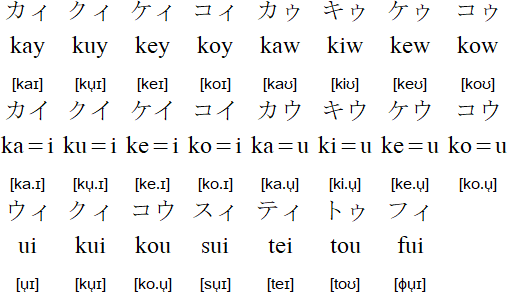Ainu is spoken on the northern Japanese island of Hokkaido. It was once spoken in the Kuril Islands, the northern part of Honshu and the southern half of Sakhalin. The last Ainu speaker on Sakhalin died in 1994. Ainu is a language isolate, unrelated to any other language. In 2008 there were just two native speakers of Ainu. A small number of people are learning it as a second language as well.
The vast majority of the 150,000 people who claim to be ethnically Ainu speak only Japanese. The actual number of people of Ainu descent is thought to be higher, however many are unaware of their ethnicity or deny it through fear of discrimiation.
Efforts are being made to revive and revitalise Ainu. These include the documentation of oral literature, the production of teaching and learning materials, language classes and training for teachers of Ainu. There are some Ainu programs on the radio, an the magazine the Ainu Times (アイヌタイムズ) is published in Ainu four times a year.
Ainu is officially written with a version of the Japanese katakana syllabary. A Latin-based alphabet is also used. The Ainu also have a rich oral tradition, including Yukar (sagas of heros), Kamui Yukar (stories of the gods) and Uwepeker (old stories).
In 2019, the Japanese government officially recognized the Ainu language for the first time.


Download Ainu script charts (Excel)
Sinean to ta petetok un sinotas kusu payeas awa, petetokta sine ponrupnekur nesko urai kar kusu uraikik neap kosanikkeukan punas=punas.
(from the Kamui Yukar)

ある日に(川の)水源の方へ(私が)遊ぶに(私が)出かけたら(思いがけなく)(川の)水源に一人の小男が胡桃(くるみ)の木の梁(やな)をたてるため(胡桃の木の)杭を打っていた。 (それに下げた)腰を幾度も上げて立っている。(腰を曲げ曲げしている。)
One day, as I was setting out traveling toward the source of the (river's) water, the walnut wood post was struck as at the water's source a little man all by himself was erecting a walnut wood plank. He was standing there now bent over at the waist and now standing up straight over and over again.
Source: http://members.at.infoseek.co.jp/kumanesir/inpaku/inpaku1/ekzemplo-j.html
Information about Ainu | Numbers
Information about the Ainu language and people
http://en.wikipedia.org/wiki/Ainu_language
http://www0.un.org/french/works/culture/japan_story.html
http://www.lowlands-l.net/anniversary/aynu-info.php
Online Ainu lessons
http://www.stv.ne.jp/radio/ainugo/
Online Ainu wordlists and dictionaries (in Japanese)
http://city.hokkai.or.jp/~ayaedu/udic/udic0.html
Aino Folk-Tales - English translations of Ainu stories
http://www.sacred-texts.com/shi/aft/
The Oral Literature of the Sakhalin Ainu: The Tuytah
http://www.aa.tufs.ac.jp/~mmine/kiki_gen/murasaki/asai01e.html
アイヌ文化振興・研究推進機構 (The Foundation for Research and Promotion of Ainu Culture)
http://www.frpac.or.jp
北海道立アイヌ民族文化研究センター (Hokkaido Ainu Culture Research Center)
http://www.pref.hokkaido.jp/kseikatu/ks-ambkc/hacrc/hp/index.htm
北海道のアイヌ語地名 (Information about Ainu place names in Hokkaido)
http://www.asahi-net.or.jp/~hi5K-stu/aynu/
アイヌ民族博物館 (The Ainu Museum, Hokkaido)
http://www.ainu-museum.or.jp
List of books and other sources of information about Ainu
http://www.tooyoo.l.u-tokyo.ac.jp/ichel/archive/ainu.html
Adaizan, Ainu, Basque, Burushaski, Candoshi-Shapra, Chitimacha, Eskayan, Hadza, Haida, Karuk, Kawésqar, Keres, Kuot, Kusunda, Kutenai, Natchez, Nihali, Nivkh, Páez, Purepecha, Sandawe, Seri, Sumerian, Tartessian, Ticuna, Tiwi, Tonkawa, Tunica, Urarina, Waorani, Warao, Wardaman, Washo, Yaghan, Yele, Yuchi/Euchee, Zuni
Ainu, Amami, Japanese, Kikai, Miyakoan, Okinawan, Okinoerabu, Tarama, Tokunoshima, Yaeyama, Yonaguni, Yoron
Page last modified: 20.05.21
[top]
You can support this site by Buying Me A Coffee, and if you like what you see on this page, you can use the buttons below to share it with people you know.

If you like this site and find it useful, you can support it by making a donation via PayPal or Patreon, or by contributing in other ways. Omniglot is how I make my living.
Note: all links on this site to Amazon.com, Amazon.co.uk
and Amazon.fr
are affiliate links. This means I earn a commission if you click on any of them and buy something. So by clicking on these links you can help to support this site.
[top]